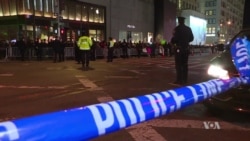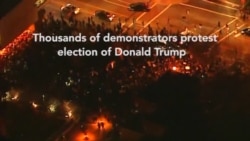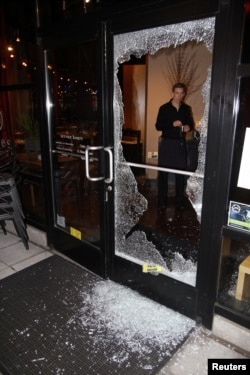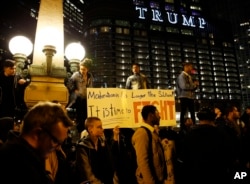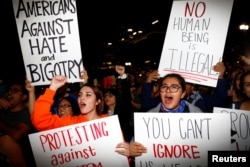Tens of thousands of people from New York to California filled the streets of large U.S. cities for a third day Thursday to demonstrate their dismay at Donald Trump's election to be the United States' 45th president.
Demonstrations occurred from Portland, Oregon, to Chicago, to New York and parts in between. Each typically drew a few hundred people, fewer than the thousands that surged to protest after it became clear Trump had won Tuesday's election.
Late Thursday night, Trump went on Twitter to take on the protesters. He tweeted: "Just had a very open and successful presidential election. Now professional protesters, incited by the media, are protesting. Very unfair!"
Early Friday morning the president-elect took to Twitter again to say that the "small groups of protesters last night have passion for our great country," adding "we will all come together and be proud!"
WATCH: Protests across US
Rioting in Portland
In Portland Thursday night, thousands marched throughout the city. Police reported rioting, with smashed store windows, exploding firecrackers and some people carrying baseball bats. Oregon Transportation Department officials intermittently closed local portions of Interstates 5 and 84 as a precaution.
In downtown Denver, protesters managed to shut down Interstate 25 briefly Thursday night.
Denver police tweeted around 10 p.m. local time that demonstrators had made their way onto the freeway and halted traffic in northbound and southbound lanes. Police said the interstate was reopened about half an hour later as the crowd moved back downtown.
Earlier protests in Denver, Boulder and Colorado Springs on Wednesday and Thursday were peaceful.
Protesters briefly shut down interstate highways in Minneapolis as well.
In Philadelphia, protesters near City Hall held signs saying "Not Our President," "Trans Against Trump" and "Make America Safe For All."
About 500 people turned out at a protest in Louisville, Kentucky, and in Baltimore, hundreds of people marched to the stadium where the Ravens were playing a football game.
In San Francisco earlier Thursday, many of the marchers were African-American and Hispanic students.
Demonstrators said they were frightened by the tone of Trump's campaign comments about immigration, and accused him of racism and xenophobia.
In Photos: Anti-Trump protests
Protests rage on across US
A large group of marchers gathered outside the Trump Tower in New York City. They included pop superstar Lady Gaga, who stood on a truck waving a sign popularized by supporters of Trump's vanquished Democratic rival, Hillary Clinton: "Love Trumps Hate."
One New Yorker said he feared that Trump's avowed desire for "law and order" in American cities would lead to police targeting more blacks for unfair and unwarranted searches and harassment.
Hundreds of students stormed out of their classrooms Thursday in San Francisco and marched to the city's famed Fisherman's Wharf.
"In our hearts, we are supporting the students," city schools superintendent Myong Leigh said. "This is technically not a school-sponsored activity. This is students taking their feelings and emotions and channeling them in a way that feels right to them."
Some marchers in Los Angeles burned a large paper bust of Trump, and prepared new attempts to blockade the city's crowded auto freeways. Others in Oakland, near San Francisco, threw gasoline bombs and fireworks at police and blocked highways with garbage fires. At least 30 people were arrested.
Some of Trump's harshest comments during the campaign were aimed at Mexican immigrants, many of whom he singled out as criminals and rapists. In campaign speeches, he has threatened mass deportations of immigrants living in the U.S. without legal residence or work permits.
Trump also has directed tough words at Muslim-Americans, both immigrants and longtime U.S. residents.
Fears stoked
Many protesters believe Trump will fill vacancies on the nation's highest court by appointing political conservatives. A Trump presidency, they warn, could overturn laws protecting women's right to abortion and equal treatment for homosexuals, including in marriage.
Trump has promised to be a president for all Americans, but he has not mentioned the protests or discussed his policy positions in detail since becoming president-elect.
Republican National Committee spokesman Sean Spicer told a television interviewer that this is the time for anti-Trump protesters to "get it out of their systems" and exercise their right to free speech, as long as "they give this man that was just elected very historically and his new vice-president an opportunity to govern."




